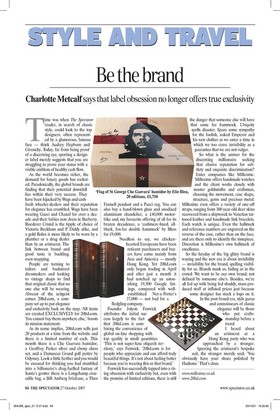Be the brand
Charlotte Metcalf says that label obsession no longer offers true exclusivity Time was when The Spectator reader, in search of classic style, could look to the top designers, often represented by a glamorous, famous face — think Audrey Hepburn and Givenchy. Today, far from being proof of a discerning eye, sporting a designer label merely suggests that you are struggling to prove your status with a visible emblem of healthy cash flow.
As the world becomes richer, the demand for luxury goods has rocketed. Paradoxically, the global brands are finding that their potential downfall lies within their very success. They have been hijacked by Wags and cashfresh wheeler-dealers and their reputation for elegance has crumbled. Wags have been wearing Gucci and Chanel for over a decade and their babies now dress in Burberry. Roederer Cristal is the tipple of choice of Victoria Beckham and P. Diddy alike, and a gold Rolex is more likely to be worn by a plumber or a drug dealer than by an aristocrat. The link between brand and good taste is buckling, even snapping.
People are turning to tailors and backstreet dressmakers and looking to vintage shops to find that original classic that no one else will be wearing. Abreast of the zeitgeist comes 201td.com, a company set up to put elegance and exclusivity back on the map. 'All items are created EXCLUSIVELY for 201td.com. You cannot buy them anywhere else,' boasts its mission statement.
As its name implies, 201td.com sells just 20 products at a time from the website and there is a limited number of each. This month there is a Che Guevara humidor, a Geoffrey Parker silver and ebony chess set, and a Damascus Grand golf putter by Odyssey. Look a little further and you would be excused for thinking you had stumbled into a billionaire's drug-fuelled fantasy of Santa's grotto: there is a Longchamp crocodile bag, a Bill Amberg briefcase, a Theo Fennell pendant and a Pucci rug. You can also buy a hand-blown glass and anodised aluminium chandelier, a £40,000 motorbike and, my favourite offering of all for its brazen decadence, a 'cashmere-lined, allblack, fox-fur double hammock' by Bless for £9,000.
Needless to say, we chickenhearted Europeans have been reticent purchasers and buyers have come mainly from Asia and America — mostly Hong Kong. Yet 201td.com only began trading in April and after just a month it had notched up an astonishing 19,500 Google listings, compared with wellestablished Net-a-Porter's 37,000 — not bad for a fledgling company.
Founder Jolyon Fenwick attributes the initial success largely to the fact that 201td.com is combining the convenience of global on-line shopping with top quality in small quantities. 'This is not super-luxe oligarch territory,' says Fenwick. `201td.com is for people who appreciate and can afford truly beautiful things. It's not about feeling better because you're wearing this or that brand.'
Fenwick has successfully tapped into a rising obsession with exclusivity but, even with the promise of limited editions, there is still the danger that someone else will have that same fur hammock. Ubiquity spells disaster. Spare some sympathy for the foolish, naked Emperor and his new clothes as we enter a time in which we too crave invisibility as a guarantee that we are not vulgar.
So what is the answer for the discerning millionaire seeking that elusive reputation for subtlety and exquisite discrimination? Enter companies like Millesime. Millesime offers handmade watches and the client works closely with master goldsmiths and craftsmen, choosing the movement, case shape, structure, gems and precious metal. Millesime even offers a variety of one-off straps, ranging from 300-year-old deer skins recovered from a shipwreck to Venetian tattooed leather and handmade link bracelets. Each watch is unique. Even the hallmark and reference numbers are engraved on the reverse of the case, rather than on the face, and are there only to identify the timepiece. Discretion is Millesime's own hallmark of excellence.
So the heyday of the big glitzy brand is waning and the new era is about invisibility — invisibility for the brand, spelling visibility for us. Brands mask us, hiding us in the crowd. We want to be our own brand, not defined by someone else's. Besides, we're all fed up with being fed shoddy, mass-produced stuff at inflated prices just because some designer has stuck a logo on it. In the post-brand era, style gurus and connoisseurs of classic elegance will be those who put craftsmanship before a trend.
I heard about an aristocrat at a Hong Kong party who was approached by a stranger. Ignoring the aristocrat's bespoke suit, the stranger merely said, 'You obviously have your shoes polished by Hudsons.' That's class.
www.millesime.co.uk www.201td.com


































































 Previous page
Previous page